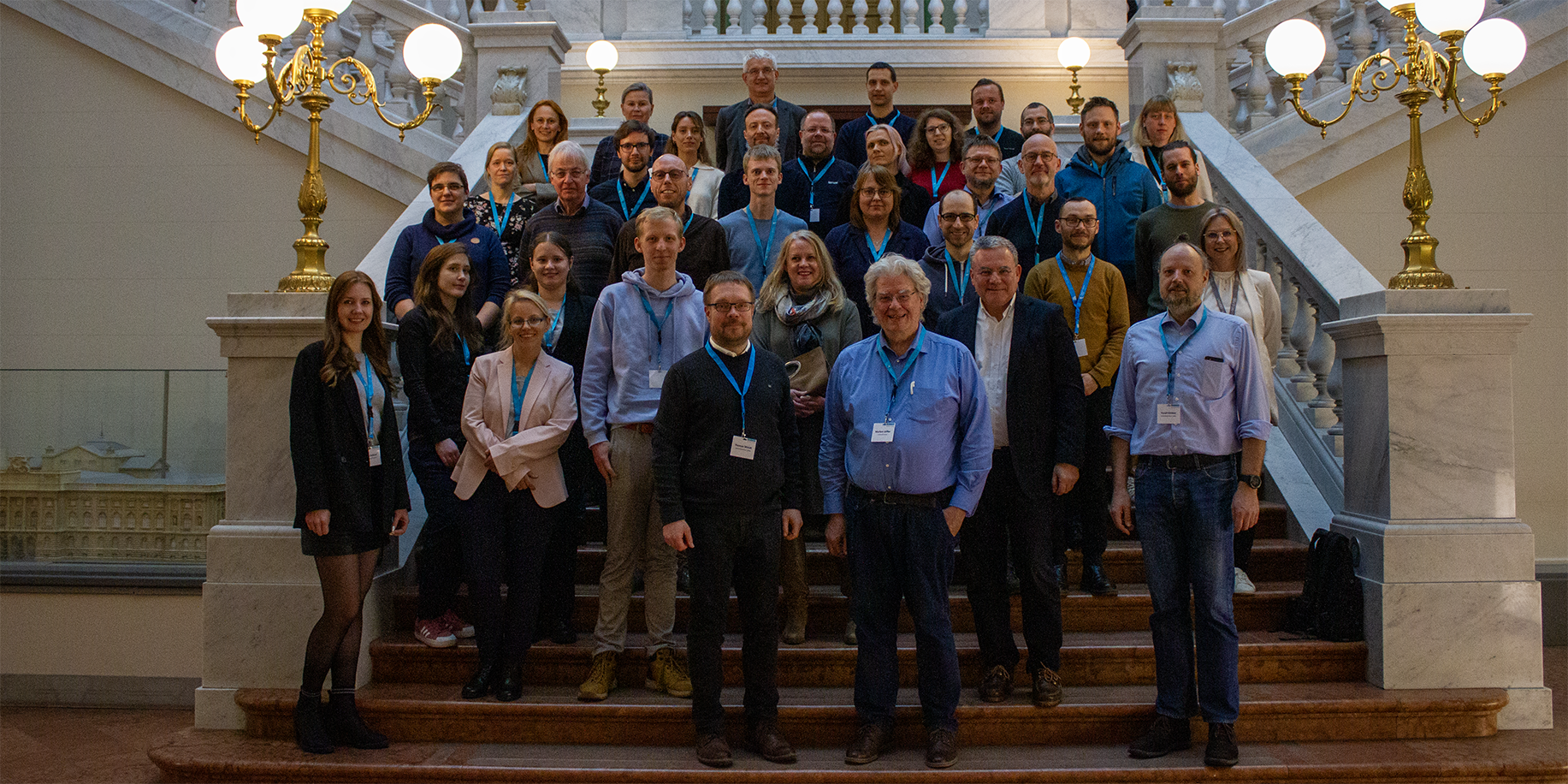
Preparing the Infrastructure of the Medical Informatics Initiative (MII) for the Future | 1st SMITH Closed Meeting on March 5-6, 2024 in Leipzig
About 45 members of the SMITH Consortium met on March 5 and 6, 2024, at the Albertina Library of the Leipzig University for the first SMITH Closed Meeting of the year. In addition to current progress on the establishment of the Data Integration Centers, the focus was on projects for further education within the Medical Informatics Initiative (MII), the junior research groups and the new Health Data Use Act.
As part of the opening, SMITH Consortium leader Professor Markus Löffler reported on the first meeting of the National Steering Committee (NSG) of the MII with the Patient Forum. Representatives of various patient organizations have already been able to submit concrete proposals to the NSG, for example on research into the safety of drug treatments. The patient representatives showed a general interest in working together and will be more closely involved in future decisions within the MII.
Platforms for continuing education in the MII underway
The first thematic block of the meeting was dedicated to continuing education. As in the previous retreats, Professor Toralf Kirsten from the Leipzig University presented the current status of the MII Academy. In the MII Academy, experts teach clinical researchers how to use data from clinical care in the MII. The MII Academy provides a portal with learning videos on relevant topics. The first videos are already uploaded. The portal will be open to all interested parties at the beginning of April.
Dr. Birgit Schneider, also from the University of Leipzig, presented the MII project baseTraCE. The network serves as a central hub for further education and training measures in the MII. baseTraCE provides a platform that brings together the training opportunities and information structures created within the consortia for new DIZ staff, researchers and students.
Junior research groups present first results
On the second day, the Junior Research Groups “Terminology- and Ontology-based Phenotyping” (TOP) from the Leipzig University and “Predictive Analysis and Data-driven Artificial Intelligence for Logistical Support of Care Processes” (KI-LoV) from the Jena University Hospital had the opportunity to present the current status of their work. Both groups have been in operation since 2021 and 2020, respectively, and have achieved various milestones since then.
Dr. Alexandr Uciteli (Leipzig University), leader of the TOP Junior Research Group, presented the functions of the framework developed in the group. The TOP framework is implemented as a modular web application that combines different software tools and services for algorithmic phenotyping. With algorithmic phenotyping, characteristics (phenotypes) of patients can be mapped and automatically recognized. The framework can be used at https://top.imise.uni-leipzig.de/.
The KI-LoV Junior Research Group led by Dr. Sasanka Potluri (Jena University Hospital) is working on making hospital processes more efficient with the help of artificial intelligence. Automatic demand forecasting and simulations of clinical processes are being tested on the basis of various use cases. Among other things, the group has developed a web application that simplifies staff scheduling and calculates the best routes for patient transport. The young researchers have also created simulation models for the consumption of blood products in order to minimize the waste of perishable medical resources and increase the benefit of available products. Three other use cases in the areas of emergency admissions, bed management, and warehouse management remain to be implemented.
Health Data Use Act (GDNG) Offers Opportunities and Perspectives for MII
At the end of the conference, the SMITH Team welcomed a special guest: Sebastian Semler, head of the TMF e.V. Head Office and MII Coordination Office, presented the new German Health Data Use Act (GDNG) and discussed its impact on health research as well as its impact on the MII.
The GDNG aims to make health data more accessible for research by facilitating its use for public welfare purposes. Among other things, the GDNG will create a decentralized infrastructure for health data that will be managed by a central body to access and coordinate the use of these data.
The new legislation raises the question of whether the broad patient consent established by the MII is still necessary. Sebastian Semler has a clear answer: “There are various reasons and usage scenarios why we still need broad consent despite the GDNG,” he emphasizes. These include issues such as the use of samples, the sharing of data with partners outside the data-processing healthcare institutions, and the recontacting of patients.
“The GNDG offers us numerous opportunities and perspectives – especially in preparation for the Europe-wide use of health data within the framework of the European Health Data Space (EHDS),” summarizes Sebastian Semler. “The GDNG also strengthens the decentralized, federated infrastructure. Data Integration Centers and the The German Portal for Medical Research Data (FDPG) can thus perform essential tasks to connect to the EHDS.”
Other topics discussed at the retreat included FHIR transfer services, ongoing DIZ Data Use Projects, the MII Test Infrastructure, and a status update from partners at Düsseldorf University Hospital, University Medical Center Rostock, and Ruhr University Bochum.
The next SMITH Closed Meeting will be held online on May 7, 2024.

